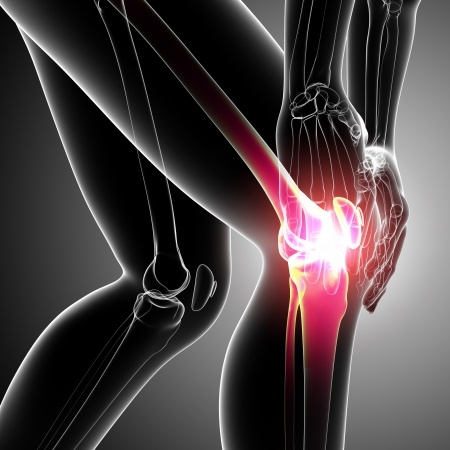 Common Causes of Knee Pain and Natural Ways to Help Heal
Common Causes of Knee Pain and Natural Ways to Help Heal
Odds are that you will know if you’ve injured your knee if it occurs due to some sort of event, like a fall, or a sports injury. But sometimes, an old injury comes back to haunt you unexpectedly or you are visited by one of the many other causes of knee pain.
By far the most common source of knee pain is chronic repetitive stress simply due to walking, running, or overuse. Because the knee joint absorbs much of the impact of your mobility, tiny tears can occur in the “shock absorber” of the knee, also called the meniscus. These micro tears can become worse as you go on about your life. Also, as you age, the collagen in your body starts to deteriorate, making painful joints more likely and leading to osteoarthritis, a leading cause of joint pain after age 50.
Inactivity or a sedentary lifestyle can cause the muscles surround the knee joint to slacken and become unable to support the knees. Additionally, if the bursa (a sac that holds a small amount of fluid located just under the skin above the knee) gets irritated or inflamed, you can develop bursitis. Or if the tendon that connects the kneecap to the shin becomes irritated, you can develop tendinitis.
Another common issue is iliotibial (IT) band syndrome. The IT band runs along the outside of your thigh from your hip to the outer area of the knee. When it becomes inflamed, the pain appears to be originating from the outside of the knee joint.
A rarer cause of knee pain is an autoimmune disease, such as fibromyalgia or Hashimoto’s hypothyroidism, that can cause flare-ups of joint pain. If you have a predisposition to knee joint pain, an autoimmune disorder may attack you in that area.
Addressing Knee Pain Naturally
Once you’ve narrowed down what is causing your non-injury related knee pain, what can you do to address it naturally? The old stand-by of R.I.C.E (Rest, Ice, Compression, Elevation) is still King.
-
Rest –It’s difficult to do, especially if you are used to a certain level of activity, but the first thing to do is to avoid overstressing your knee which may make the knee injury worse.
-
Ice –After each exertion, ice your knee for twenty minutes on and twenty minutes off for as long as you can stand it. (Some physicians recommend alternating hot and cold packs for twenty-minute intervals.)
-
Compression –Wrap your knee or use a handy-dandy compression sleeve to keep your knee as stabilized as possible.
-
Elevate –When you can, elevate the knee (preferably at or below the level of your heart) to minimize swelling.
Aside from RICE, try the following remedies:
-
Epsom salt bath. High in sulfates and magnesium, Epsom salts are easily absorbed via the skin to reduce inflammation and relax muscles.
-
Supplements. While there is still relatively little research regarding the use of supplements on knee joint pain, physicians have known anecdotally for many years that certain types of joint pain are caused by nutritional deficiencies. Most naturopaths would encourage you to use anti-inflammatory herbs such as turmeric and ginger in your cooking and to incorporate Omega-3 fatty acids found in wild-caught salmon, tuna, and grass-fed beef, as well as chia seeds, flax seeds, and walnuts. Explore whether adding supplements such as Vitamin D, calcium, and glucosamine are helpful in managing your joint pain.
-
Weight Loss. If appropriate, reducing the number of extra pounds you are carrying around may reduce the strain on your joints. Even a few pounds can add to the stress on your knee joint.
-
Anti-inflammatory diet. Change your diet to an anti-inflammatory one concentrating on whole, fresh foods loaded with antioxidants. Try to avoid all processed foods and to choose foods that are lower on the glycemic index, such as berries.
-
Exercise. Once the initial flare-up is managed, try to incorporate some low-impact movement into your day. Inactivity can cause stiff muscles and worsen conditions such as arthritis. Regular exercise helps stretch affected joints and muscles and keeps the knee joint supple. Don’t forget to replenish electrolytes after exertion.
Knee joint pain may be caused by any number of things, so be sure to consult a physician to rule out anything more serious.
Thanks again to my friend Joe, Co-Founder of Vive Health for another great post. They are always so helpful. Don’t miss his post on better posture habits!


Leave a Reply